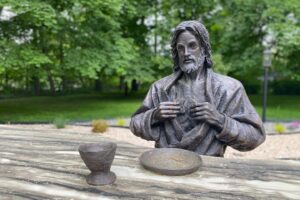I rather enjoy Lent. Well, enjoy might not be the right word, but I find it a uniquely humbling and reflective time of the ecclesial calendar.
The season of Lent is designed to emulate Jesus’ 40 days in the desert in preparation for his ministry. Starting with Ash Wednesday and leading into Easter week, it seems to be a time of the church year that encourages quiet and honest spirituality. Christmas is wonderful in its own way, but at times it can be a bit noisy or cluttered to be a time of introspection. Perhaps that is part of it, during Lent we are encouraged to sift through our thoughts and motivations, to contemplate mortality and throw ourselves into a time of examining our loves (and whether we are loving the wrong things too much).
I have a friend who was raised in Japan. He is smart as a whip and has some truly great insights. But one of the things that struck me was when he told me that he reads Silence by Shusaku Endo every Lent. After reading Silence in 3-4 sittings, I can understand why.
 Silence is a book by Shusaku Endo and now a beautiful and somber movie by Martin Scorsese. It is historical fiction and somewhat born out of the author’s own inner conflict between being raised in an eastern culture yet have a western faith. Up front, I must say that it is not at all – and yet precisely for- the faint in heart. Not only that, but I am rather convinced that it will not do well with the usual church crowd. It is too piercing, too real, too exposing to be seen as a “feel good movie.”
Silence is a book by Shusaku Endo and now a beautiful and somber movie by Martin Scorsese. It is historical fiction and somewhat born out of the author’s own inner conflict between being raised in an eastern culture yet have a western faith. Up front, I must say that it is not at all – and yet precisely for- the faint in heart. Not only that, but I am rather convinced that it will not do well with the usual church crowd. It is too piercing, too real, too exposing to be seen as a “feel good movie.”
Why is this? My best theory is that Western Christianity has been too keen on being militant, or triumphant, trying to be the top-dog, or what have you. To have an approach to the faith that encourages and even emphasizes constant fighting, waging wars or trying to legislate Christianity into the broader world seems to me as the antithesis of what it should be. The moment the Christian faith takes on a character of force rather than service, of proud ego rather than love, it has lost sight of its most important event… The crucifixion of God.
Silence is a movie that hinges on more than a few important themes. Using the backdrop of persecution of Spanish missionaries and Christians in Japan, it is really a movie about weakness, frailty, doubt, egoistic faith, and pride. The basic query of Silence is that of letting go of a proud faith that fixates on being the hero rather than the one being rescued. The reality is that Silence (and Lent) can lead us to look upon ourselves with brutal honesty and see that we cannot separate ourselves from the weak, the doubting, the conflicted. In short, because that is who we really are. Any faith that tries to hide that reality from us is dubious at best.
Of course we want to be strong, and we want to not look at our failures, but those are not the people for whom Jesus came. In the words of Shusaku Endo, the Son of Man came for those who would betray him, who would trample all over him. Therefore, to not recognize oneself as among that crew, may mean to place far too much emphasis on us and our ability. By self-identifying ourselves as among the elite of faith, who see the world in black-and-white, we may actually be disassociating with who Jesus really is. It is a fascinating back and forth, the main character is torn between identifying himself as Jesus or as Judas.
The whole book leads to a crescendo when the main protagonist is asked if he would give up his faith if it meant saving the lives of others. He needs to decide in those heightened moments if the faith he always had was egoistic and proud or honest about his own weaknesses/doubts. The protagonist must answer if his faith was really about him being counted among the great or among the least… I will not share what happens, because it is a unique ending that you may not see coming. I loved the book and the movie because the ending rises above simplistic perspectives of faith and enters into profound mystery. And so…
May this Lenten season cause you to re-examine your loves, to purge your faith of pride and ego, to wrestle with your weakness, and find that God may be somewhere in the midst of your faith and doubt, love and apathy, commitment and apostasy.


